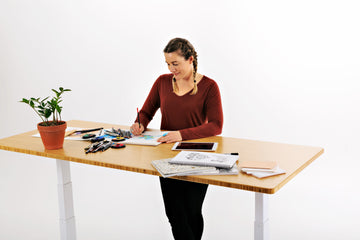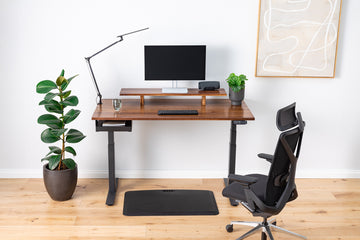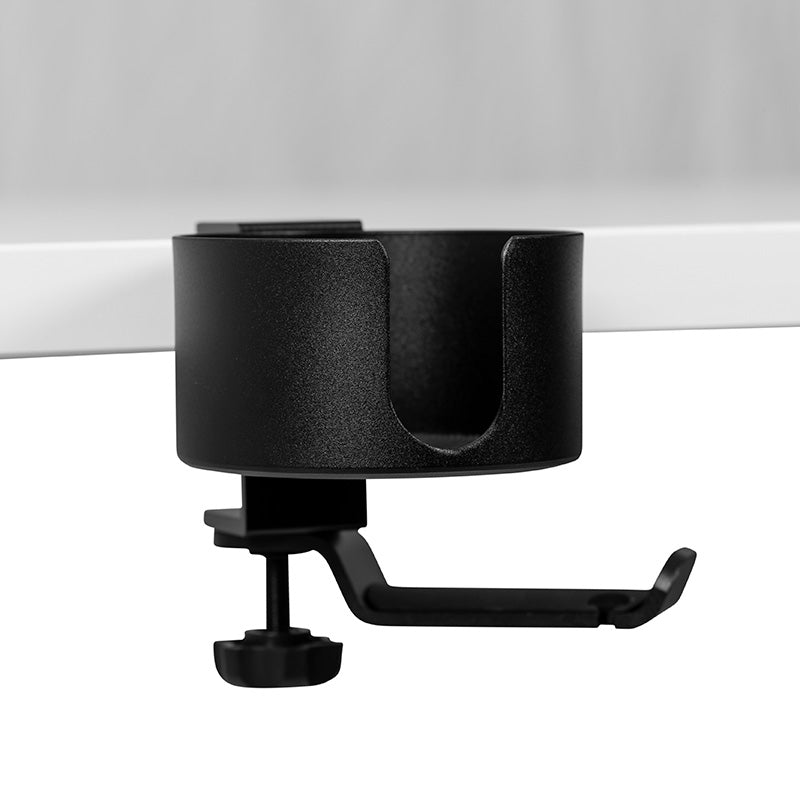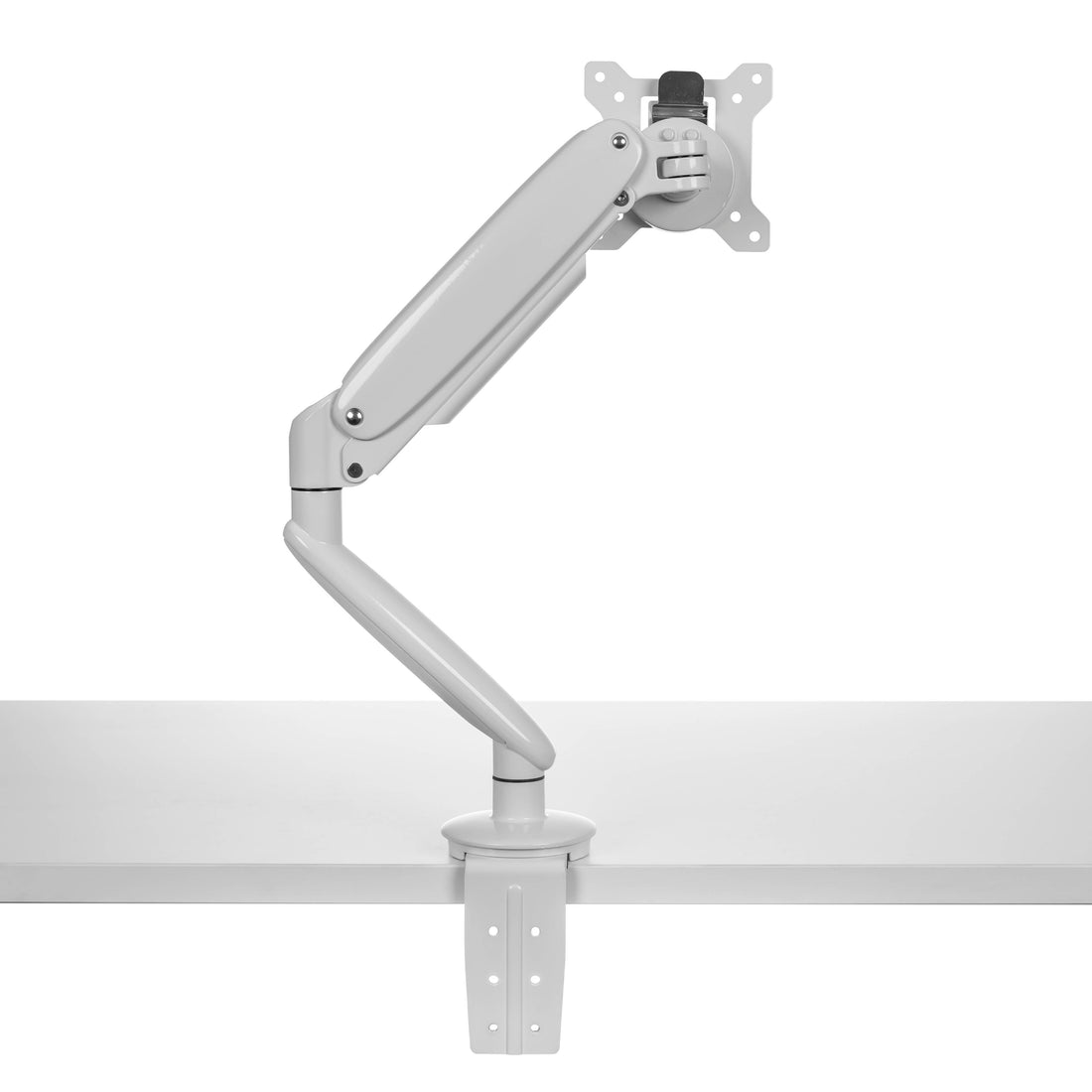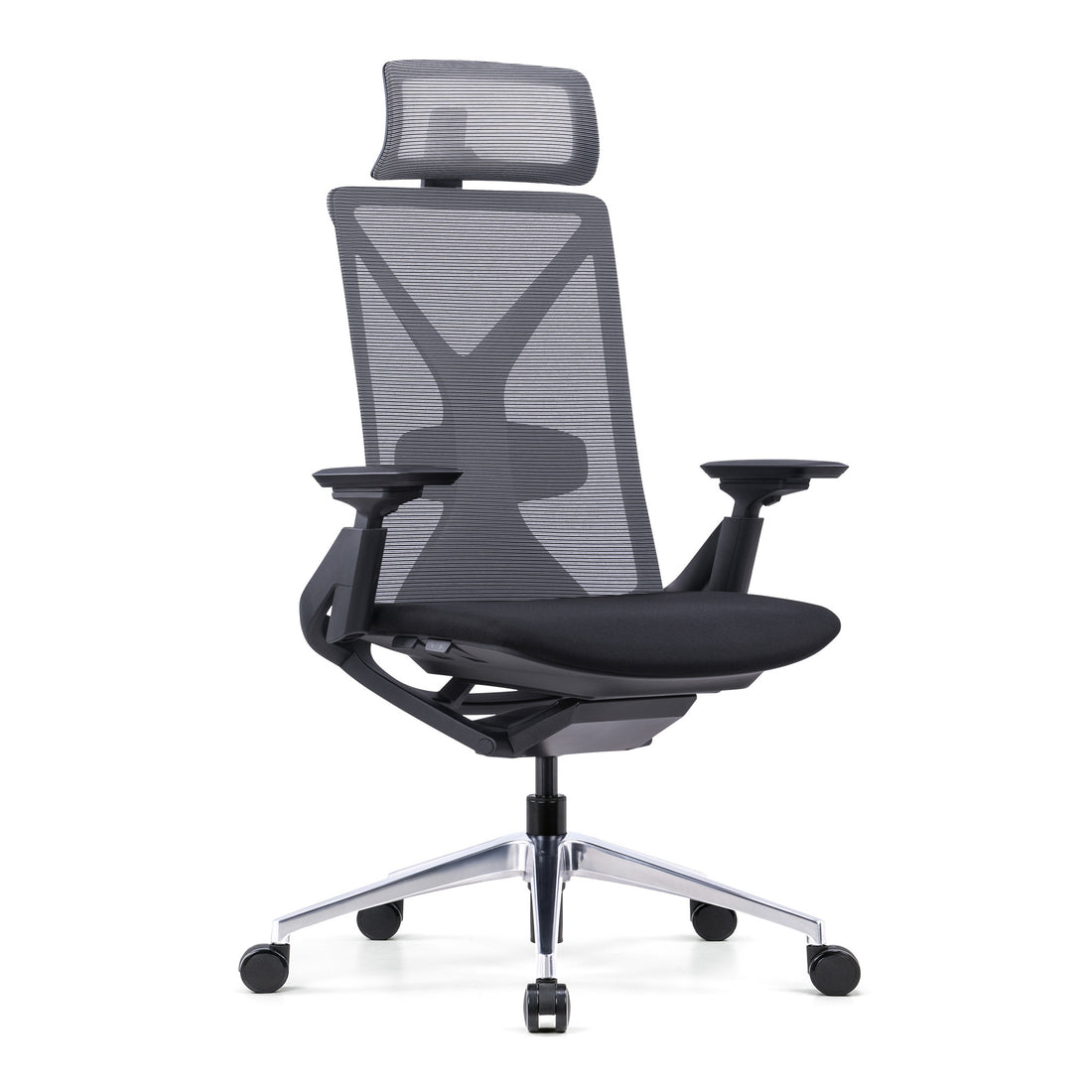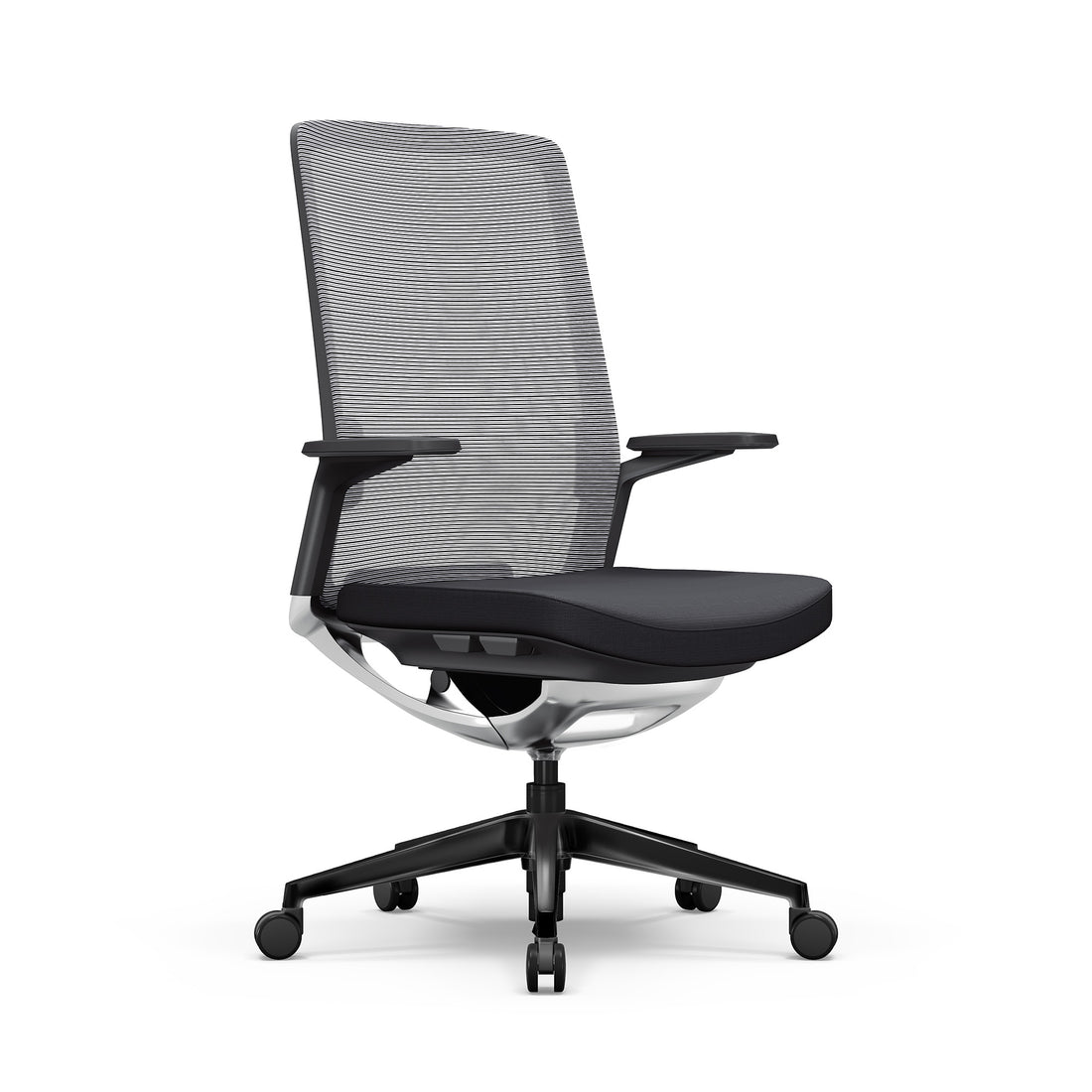Welcome to UpDown Desk's comprehensive guide on standing desk productivity. This article dives into how standing desks can boost workplace efficiency by increasing energy, reducing discomfort, and improving focus. Backed by scientific research and real-world examples, you'll learn how to harness the benefits of standing desks, whether working from home or in the office. Explore practical tips and insights on how standing desks can be a powerful tool to enhance your productivity and overall performance.
1. The Link Between Standing Desk Usage and Productivity
The growing adoption of standing desks in workplaces has sparked interest in their ability to improve health and boost productivity. Numerous studies have demonstrated how standing desks lead to better focus, reduced fatigue, and enhanced overall performance in the workplace. By allowing employees to alternate between sitting and standing, these desks create a more dynamic and engaging environment, positively impacting efficiency. In the following sections, we’ll explore the specific benefits and key research highlighting the undeniable connection between standing desk usage and increased productivity.
1.1 Overview of Productivity Benefits
Standing desks offer more than just health advantages; they significantly enhance workplace efficiency. Here's a quick look at the impressive statistics that show how standing desks can revolutionize productivity:
- Standing desks can increase productivity by up to 46%.
- Workers using standing desks report a 45% higher efficiency in task completion.
- Alternating between sitting and standing boosts employee productivity by an average of 23%.
- Employees using standing desks reduce the frequency of breaks by around 30%.
- Standing for part of the day can improve focus and concentration by 33%, compared to remaining seated for prolonged periods.
Standing desks have been embraced in workplaces worldwide, not just for their health benefits but also for their ability to enhance productivity. The concept is straightforward: standing allows for more movement, which stimulates blood flow, reduces feelings of fatigue, and promotes better focus. In contrast, sitting for long hours can lead to discomfort, decreased energy, and lower work efficiency. The standing desk benefits extend to improving overall productivity, making it a key factor for companies looking to enhance employee output.
Research shows that extended sitting is detrimental to physical health and mental performance. The brain needs consistent blood flow and oxygen to function optimally, and standing provides a simple way to achieve this. By alternating between sitting and standing, employees experience less physical strain, leading to better concentration and higher output.
For example, studies indicate that after just 30 minutes of sitting, individuals may experience restlessness, discomfort, or reduced attention. These effects can significantly disrupt workflow, forcing workers to take more breaks or struggle to maintain focus. Standing desks address this issue by allowing users to shift positions and maintain a higher level of engagement throughout the day.
1.2 Key Studies Supporting Increased Productivity
Scientific studies have provided ample evidence to support the productivity-enhancing effects of standing desks. One of the most widely cited studies comes from a call center, where employees using standing desks were found to be 45% more productive than their seated colleagues. This remarkable improvement was attributed to the increased energy levels and reduced physical fatigue experienced by those who had the option to stand throughout their workday.
In another study published in Occupational and Environmental Medicine, researchers discovered that employees who regularly switched between sitting and standing during their workday saw a 15% to 33% reduction in fatigue. Additionally, these individuals reported a 31% decrease in musculoskeletal discomfort, significantly contributing to workplace distractions and loss of productivity.
These findings are supported by further research published in the Preventing Chronic Disease journal, where employees who used standing desks for several weeks noted substantial improvements in their overall well-being. Key statistics from the study include:
- 87% of participants reported feeling more comfortable.
- 75% stated they felt healthier after using standing desks.
- 71% noted an increase in focus and mental clarity.
- 66% said they were more productive while using standing desks.
These figures highlight the clear link between standing desk productivity and performance. Companies can foster a more productive environment by changing how employees engage with their workspace.
2 Evidence-Based Benefits of Standing Desks for Productivity
Standing desks are gaining popularity in modern workplaces, not just for their physical health benefits but also their impact on mental clarity and productivity. Research shows that standing while working improves oxygen flow to the brain, which enhances mental functions like analytical thinking, decision-making, and generating new ideas. By promoting movement and reducing sedentary behavior, standing desks help improve focus and energize workers throughout the day. Below, we explore key research findings and real-world examples demonstrating how standing desks boost productivity and workplace efficiency.
2.1 Research Findings on Standing Desks and Productivity
A surge in research has accompanied the rise of standing desks to understand their full impact on workplace efficiency. Numerous studies confirm that standing desks have the potential to dramatically improve employee output, largely by promoting movement and reducing the health risks associated with prolonged sitting. One study found that workers who used standing desks experienced fewer symptoms of fatigue and lethargy. As a result, they could complete their tasks more efficiently and with fewer breaks compared to colleagues who remained seated throughout their shifts.
Additional research supports this conclusion, with one study revealing that employees who stand for part of the day can maintain their cognitive function and focus for longer periods. The ability to switch between sitting and standing throughout the workday helps combat the mental decline that often accompanies extended periods of inactivity.
Research also indicates that proper posture at a standing desk can help maintain focus throughout the day.
2.2 How Standing Desks Improve Focus and Efficiency
The benefits of standing desks go beyond physical health improvements; they also play a crucial role in boosting mental clarity and focus. When individuals stand while working, their brains receive increased oxygen, which supports cognitive processes such as decision-making, problem-solving, and creative thinking. This enhanced brain function translates directly to better performance on tasks requiring high attention levels.
Moreover, standing helps mitigate the negative effects of sedentary behavior, such as brain fog and reduced motivation. Studies have shown that workers who incorporate more movement into their day report feeling more energized and capable of maintaining their focus for extended periods.
For instance, a common observation among users of standing desks is that they find it easier to stay alert during long meetings or intensive work sessions. By standing for part of the day, employees can break up periods of inactivity, which keeps their minds sharp and prevents the mental fatigue that typically sets in after long hours of sitting.
2.3 Case Studies: Real-World Examples of Productivity Gains
Several companies have already embraced standing desks and have witnessed tangible productivity improvements. One prominent example is Atlassian, a leading software company that introduced standing desks across its offices. The results were clear: employees reported feeling more engaged with their work and experienced fewer energy slumps throughout the day. This, in turn, led to measurable gains in overall team performance and collaboration.
Similarly, Facebook and Google, two giants in the tech industry, have incorporated standing desks into their workspaces. Their reasoning is simple: standing desks promote movement, interaction, and energy, all essential components of a productive work environment. Employees at these companies have noted improvements in their output and the quality of their teamwork, underscoring the versatility of standing desks in promoting efficiency across various job roles.
3. How Standing Desks Affect Different Aspects of Work
3.1 Impact on Task Performance

Standing desks are especially beneficial for certain tasks requiring creativity or repetitive action. For creative professionals, such as designers or writers, standing allows for greater freedom of movement, stimulating the brain and improving the flow of ideas. This can result in more innovative problem-solving and better overall performance on tasks that require out-of-the-box thinking.
For those engaged in repetitive tasks, such as data entry or administrative work, standing desks provide a way to break the monotony. Alternating between sitting and standing helps to keep the mind active and engaged, reducing the likelihood of boredom or mental fatigue, which can often lead to mistakes or decreased productivity. Workers who use a combination of sitting and standing report feeling more energized throughout the day, especially when they maintain good standing desk ergonomics.
In both cases, changing positions throughout the day helps workers stay focused and alert, improving their overall task execution.
3.2 Influence on Work Stamina and Energy Levels
One of the most significant advantages of using a standing desk is its ability to enhance work stamina. Research has shown that standing for portions of the day can help maintain energy levels, allowing workers to remain productive for longer stretches. This is particularly important in jobs that require sustained focus and mental effort, as it helps prevent the energy dips that often occur after prolonged periods of sitting.
Studies published in IIE Transactions on Occupational Ergonomics suggest that employees who use standing desks experience lower levels of physical and mental fatigue, which directly translates to higher productivity. By promoting better circulation and oxygen flow, standing desks allow workers to maintain their energy and attention throughout the day.
Additionally, standing desks encourage individuals to move more frequently by shifting weight, adjusting their posture, or walking short distances around their workspace. These small movements help prevent stiffness and discomfort, contributing to sustained energy levels and better work performance.
3.3 Psychological Effects of Using a Standing Desk
Beyond the physical benefits, standing desks have positively impacted mental well-being. The psychological effects of standing while working include improved mood, reduced stress, and greater control over one's work environment. These improvements are crucial for maintaining motivation and staying productive over the long term. Incorporating movement into the workday by standing can also help alleviate feelings of anxiety and depression, which are often linked to prolonged sedentary behavior. One study found that employees who stood for part of the day experienced significant improvements in mood and mental health, which led to higher levels of job satisfaction and engagement.
4. Practical Tips for Maximizing Productivity with Standing Desks
4.1 Setting Up Your Standing Desk for Optimal Productivity
While standing desks offer numerous benefits, proper setup is key to fully realizing those benefits. A well-designed standing desk should be adjusted to fit the individual’s body proportions and work needs. Here are some essential tips for setting up your standing desk for optimal productivity:
- Ensure that your desk height is at a level where your elbows are bent at a 90-degree angle, allowing your forearms to rest comfortably on the desk.
- Position your monitor at eye level to avoid neck strain, keeping the screen at least 20 inches from your face.
- Consider using an anti-fatigue mat to cushion your feet and reduce pressure on your legs.
- Keep frequently used items such as a keyboard and mouse within easy reach to maintain a comfortable working posture.
Finding the best desk layout for productivity is essential, as a poorly arranged workspace can negate the benefits of standing desks. It’s important to ensure that the desk height, monitor position, and tool placement work together to create a comfortable and efficient setup.
4.2 Effective Use of Standing Desks Throughout the Day
To maximize the productivity benefits of a standing desk, it's important to use it balanced and sustainably. Experts recommend alternating between sitting and standing every 30 to 60 minutes, depending on your comfort level. This helps prevent strain and allows you to experience the full benefits of the desk without overexerting yourself.
Additionally, short breaks to stretch or move around can enhance your productivity. Taking minutes to walk or perform light stretching exercises helps keep the body limber and the mind fresh. By following these best practices, you can make the most of your standing desk while avoiding common issues like muscle fatigue or discomfort.
Employees can create an efficient workspace that maximizes performance by finding the best desk layout for productivity, including standing, sitting, and movement. For added flexibility, desk risers and converters can easily transition between sitting and standing throughout the day.
4.3 Common Mistakes to Avoid
While standing desks can be a game-changer for productivity, users should know a few common mistakes. One frequent error is standing for too long without breaks. Although standing offers numerous health benefits, standing in one position for extended periods can cause strain on the legs, lower back, and feet. Alternating between sitting and standing throughout the day is crucial to avoid this.
Another common mistake is neglecting to adjust the desk height properly. If the desk or monitor is positioned too high or too low, it can lead to discomfort and reduce productivity. It’s important to take the time to adjust your desk and monitor to a height that supports good posture and comfort.
5. Who Should Consider a Standing Desk for Productivity?
5.1 Ideal Occupations and Roles
Standing desks are ideal for professionals who spend long hours at their desks. These desks are particularly beneficial for jobs that require sustained focus and engagement, such as:
- Office workers who handle administrative or managerial tasks
- Customer service representatives who need to remain alert during long phone or online interactions
- Designers, developers, and writers who need to maintain creativity and focus over extended periods
- Teachers and instructors who may benefit from using a standing desk to prepare lessons or grade assignments
These roles often involve repetitive tasks or extended periods of sitting, making standing desks a valuable tool for maintaining energy and productivity throughout the day.
5.2 Special Considerations for Different Work Environments
Standing desks can be easily adapted to different work environments, whether it's a home office or a corporate setting. Pairing a standing desk with ergonomic seating and good lighting in a home office can create a balanced, productive workspace. For corporate offices, standing desks promote movement and collaboration among employees. To get the most out of your setup, it's important to avoid bad desk ergonomics that could lead to discomfort or strain.
Adjusting the desk height based on different tasks can be especially useful for home office users. Corporate settings benefit from the collaborative nature of standing workstations, which allow employees to interact and communicate more freely.
6. Comparing Standing Desks with Other Productivity Solutions
6.1 Standing Desks vs. Traditional Desks
The most significant difference between standing and traditional desks is their impact on physical and mental health. Traditional desks promote a sedentary lifestyle, leading to discomfort, fatigue, and decreased productivity. In contrast, standing desks encourage movement and alertness, helping employees stay focused and engaged throughout the day.
The benefits of standing desks extend beyond just health improvements. They also foster a more dynamic and flexible work environment, allowing employees to adjust their posture and maintain energy levels, which leads to higher overall productivity.
6.2 Alternative Solutions for Enhancing Productivity
Standing desks are just one part of a broader approach to enhancing productivity. Other solutions, such as ergonomic chairs, adjustable sit-stand stools, and active workstations, can create a more comfortable and efficient work environment. In some cases, combining these tools with a standing desk can provide the best results, allowing for greater flexibility in posture and movement throughout the day.
For example, using an ergonomic chair alongside a standing desk can help prevent discomfort during seated periods, while active workstations encourage light movement, such as walking or cycling, during work hours. These alternative solutions complement the benefits of standing desks and create a more holistic approach to workplace productivity.
7. Conclusion: Embracing Standing Desks for Enhanced Productivity
7.1 Summary of Key Points
Standing desks are a powerful tool for enhancing workplace productivity. By promoting movement and reducing the physical strain of prolonged sitting, standing desks help employees maintain focus, energy, and engagement throughout the day. The research and real-world examples discussed in this article highlight standing desks' numerous benefits, from improved mental clarity to enhanced task performance.
Incorporating a standing desk into your workspace can significantly improve your overall well-being and productivity, making it a valuable investment for individuals and businesses. Do standing desks increase productivity? The evidence clearly shows that they do.
7.2 Final Thoughts and Recommendations
Standing desks offer a practical and effective solution for those looking to enhance their productivity and well-being at work. Whether in a home office or a corporate setting, standing desks can help you stay focused, reduce fatigue, and improve your daily performance. Finding the best desk layout for productivity is essential to ensuring that you experience the maximum benefits of this dynamic workspace tool.
If you’re considering switching, gradually increase your time standing each day. With the right setup and a balanced approach, you’ll soon notice the difference in productivity and comfort. It’s time to embrace standing desks as an integral part of the modern workspace.
8. FAQ
8.1 Do Standing Desks Really Improve Productivity?
Yes, standing desks boost productivity by allowing movement, reducing discomfort, and increasing energy levels. Alternating between sitting and standing helps prevent fatigue, keeping workers focused and efficient during long work hours.
8.2 How Do Standing Desks Affect Focus and Concentration?
Standing desks improve focus by encouraging movement, which increases blood flow and oxygen to the brain. This reduces mental fatigue and keeps you alert, enhancing cognitive performance and task efficiency.
8.3 What Are the Best Practices for Using a Standing Desk?
Alternate sitting and standing every 30-60 minutes, keep the desk at the right height, use an anti-fatigue mat, and take short breaks or stretches to stay comfortable and avoid fatigue.
8.4 Are There Any Specific Professions That Benefit More From Standing Desks?
Jobs that require long focus, like developers, writers, and designers, benefit most. Repetitive-task roles and customer service jobs also see improvements in comfort and productivity from using standing desks.
8.5 How Can I Measure the Impact of a Standing Desk on My Productivity?
Track focus, energy levels, task completion rates, and discomfort. Comparing how often you take breaks or feel fatigued while standing versus sitting helps assess a standing desk's impact on productivity.

